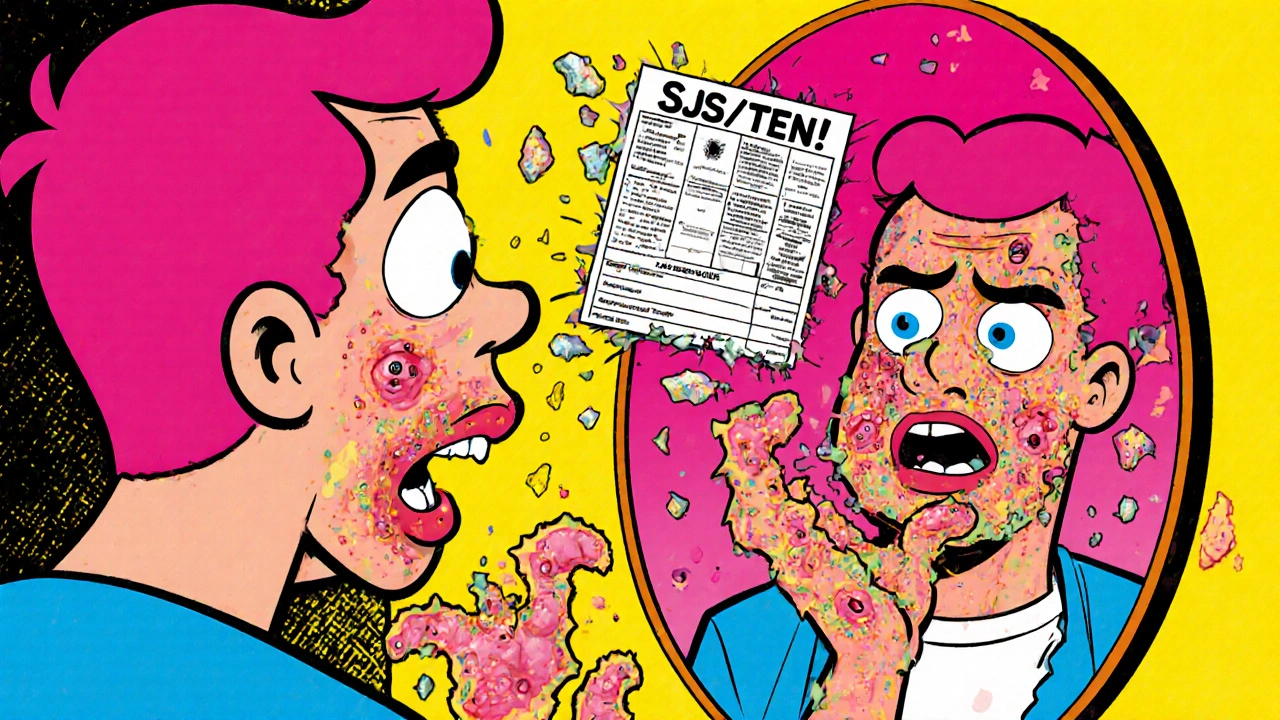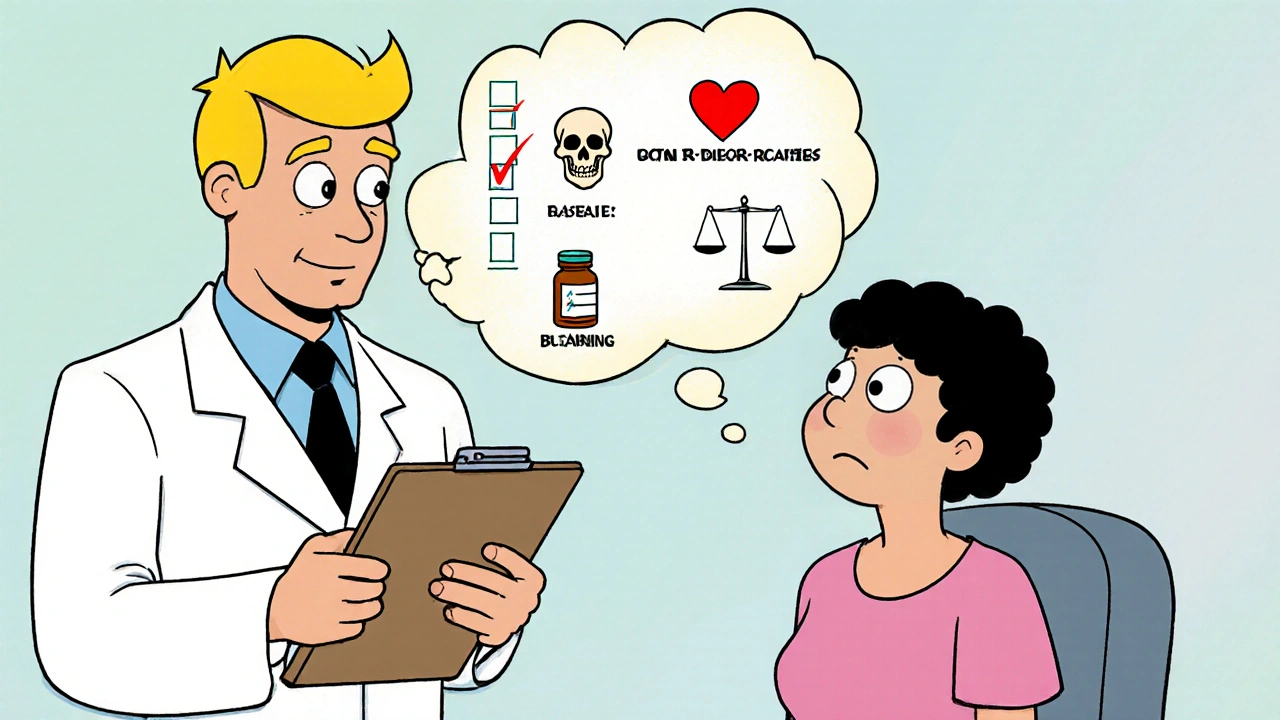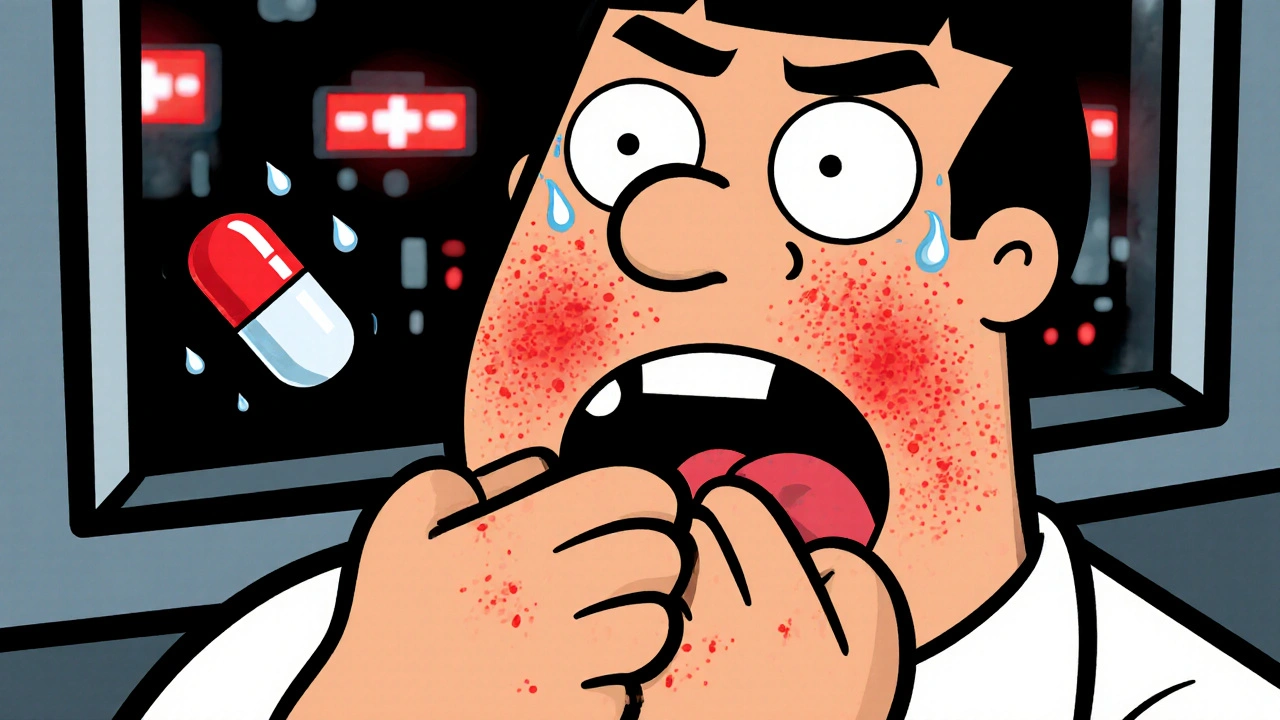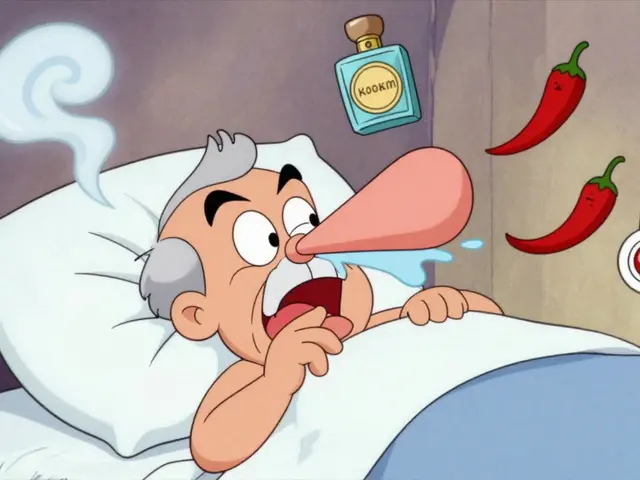Medication Safety Decision Guide
Assess Your Medication Situation
This tool helps determine if your symptoms require immediate action or if you should consult your healthcare provider. Always follow your doctor's specific instructions for your medication.
Your Medication Safety Assessment
Not all side effects are created equal. Some are annoying but harmless-maybe a dry mouth or a little dizziness that fades after a few days. Others? They can kill you if you ignore them. Knowing the difference isn’t just helpful-it’s life-or-death. If you’re taking medication and something feels dangerously wrong, you need to know exactly when to stop it right away, and when to call your doctor instead.
Stop Immediately: Life-Threatening Reactions
If you suddenly break out in hives, your throat starts closing, or you can’t breathe after taking a pill, stop the medication and call 911. This is anaphylaxis-a severe allergic reaction. It happens in about 1 to 15 out of every 10,000 people who take certain drugs. Penicillin is the most common culprit, but any medication can trigger it. This isn’t a "wait and see" situation. Delaying action can lead to cardiac arrest or death.
Another emergency sign is a spreading, blistering rash. If your skin starts peeling off in sheets, or you get painful sores in your mouth, eyes, or genitals, you could be developing Stevens-Johnson Syndrome (SJS) or toxic epidermal necrolysis (TEN). These conditions are rare-fewer than 1 in 100,000 people get them-but they kill up to half of those affected. Medications like carbamazepine, lamotrigine, allopurinol, and sulfa drugs are most often linked to these reactions. The FDA requires black box warnings on these drugs for patients with the HLA-B*1502 gene, common in Asian populations. If you have this gene and get even a small rash, stop the drug immediately.
Acute liver failure is another silent killer. You might feel tired, nauseous, or notice your skin or eyes turning yellow. Your liver enzymes (ALT) may spike. If ALT is more than three times the normal level and you have symptoms-or five times higher even without symptoms-you need to stop the medication right away. Drugs like isoniazid (used for tuberculosis) and certain antibiotics can cause this. Liver damage can progress in days. Waiting for a doctor’s appointment isn’t safe.
Agranulocytosis is another rare but deadly reaction. It means your body stops making white blood cells. You might get a sudden high fever, sore throat, or mouth ulcers. Without white blood cells, even a small infection can spiral out of control. This happens in about 1 to 15 out of every million people on certain medications, including clozapine, some antithyroid drugs, and older antipsychotics. If you suspect this, stop the drug and go to the ER. Mortality rates hit 5-10% if treatment is delayed.
Don’t Stop Cold Turkey: The Hidden Dangers of Abrupt Discontinuation
Here’s the twist: stopping some medications suddenly can be just as dangerous as ignoring a bad reaction. In fact, more people end up in the hospital from stopping meds the wrong way than from the side effects themselves.
Take beta blockers. These are used for high blood pressure, heart disease, and anxiety. If you stop them abruptly, your heart rate and blood pressure can skyrocket. In people with heart disease, this can trigger a heart attack. Studies show the risk jumps by 300% in the first week after quitting cold turkey. Rebound hypertension-where blood pressure spikes higher than before-happens in 12-25% of people who stop beta blockers suddenly.
Benzodiazepines like Xanax or Valium are another trap. People stop them because they feel drowsy or dependent. But quitting too fast can cause seizures, hallucinations, or extreme anxiety. Up to 15% of long-term users experience withdrawal seizures if they stop without tapering.
Antidepressants, especially SSRIs like sertraline or fluoxetine, can cause discontinuation syndrome in 20-50% of people. Symptoms include dizziness, brain zaps, nausea, and electric-shock sensations. These aren’t life-threatening, but they’re terrifying. Many people think they’re having a relapse and go back on the drug-not realizing it’s just withdrawal. The FDA now requires specific tapering instructions on SSRI labels because structured reductions cut these symptoms by 73%.
Even common drugs like clonidine (for high blood pressure) or prednisone (for inflammation) can cause dangerous rebound effects. Your blood pressure can crash or spike. Your body can go into adrenal crisis. Stopping these without medical guidance isn’t bravery-it’s a medical risk.

The 5-Question Framework: What to Ask Before Stopping
Not every bad feeling means you need to quit. A 2021 study in JAMA Internal Medicine tested a simple five-question tool that helped doctors make the right call 92% of the time. You can use it too.
- Is this reaction life-threatening? Anaphylaxis? SJS? Liver failure? Agranulocytosis? If yes, stop immediately and get emergency care.
- Is this a drug that causes withdrawal if stopped suddenly? Beta blockers? Benzodiazepines? Antidepressants? Clonidine? If yes, call your doctor before stopping-even if the side effect is bad.
- Are there safer alternatives? Maybe your muscle pain from statins isn’t true myopathy. Up to 95% of statin-related muscle complaints aren’t dangerous. Switching to a different statin or lowering the dose might fix it.
- What’s the risk of continuing vs. stopping? Is the side effect worse than the condition you’re treating? If you’re on a blood thinner for a history of stroke, stopping because of minor bruising could be far riskier than living with the bruise.
- What do you understand, and what do you want? Your input matters. If you’re scared, confused, or feel like the meds aren’t worth it, talk to your provider. But don’t decide alone.
This framework cuts through the noise. It’s not about being brave or stubborn. It’s about making a smart, informed call.

What Most People Get Wrong
A 2022 study found that 31% of people stopped their statins because of muscle pain. But only 5% of those cases were actual drug-induced muscle damage. The rest? They could’ve switched to another statin, lowered the dose, or taken CoQ10. Instead, they quit-and increased their risk of heart attack.
On Reddit, thousands of people share stories of quitting antidepressants because of nausea or insomnia. Doctors reply: "You didn’t give it time." But others say: "I had a panic attack after the third pill-I couldn’t wait." The truth? Most side effects fade in 1-2 weeks. But if you’re having thoughts of self-harm, severe agitation, or hallucinations? That’s not "adjusting." That’s urgent.
And here’s the scary part: 42% of people stop their meds without telling their doctor. Eighteen percent of those end up with worse problems-like rebound hypertension, seizures, or uncontrolled depression. You don’t need to suffer in silence. You need to call someone.
What to Do Right Now
If you’re on medication and worried about side effects:
- Keep a symptom journal. Note what you took, when, and how you felt.
- Know your drug’s black box warnings. Look them up on the FDA website or ask your pharmacist.
- Never stop a blood pressure, heart, seizure, or psychiatric drug without talking to your provider.
- If you have trouble breathing, a spreading rash, yellow skin, or sudden fever-go to the ER. Don’t wait.
- Ask your pharmacist: "Is this one of the drugs that can hurt me if I stop suddenly?" They’re trained to spot these risks.
Medications save lives. But they can also hurt you-if you don’t know how to use them wisely. The goal isn’t to avoid side effects at all costs. It’s to avoid the worst outcomes. Sometimes that means pushing through mild discomfort. Other times, it means stopping immediately. You don’t need to guess. You just need to know the signs.
Can I stop my medication if the side effects are bothering me?
It depends. Mild side effects like nausea, dizziness, or dry mouth often go away after a week or two. Stopping too soon might mean you miss out on the drug’s benefits. But if the side effect is severe-like trouble breathing, a rash that spreads, or yellowing skin-you should stop immediately and get help. Always check with your doctor before quitting, especially for blood pressure, heart, or psychiatric meds.
What if I stopped my medication without telling my doctor?
Call your doctor as soon as possible. Even if you think it’s too late, they need to know. If you stopped a beta blocker or antidepressant suddenly, you could be at risk for rebound high blood pressure, seizures, or severe withdrawal. Your provider can assess your condition and help you get back on track safely-whether that means restarting the drug slowly or switching to something else.
Are there any side effects that always mean I should stop the drug?
Yes. Life-threatening reactions like anaphylaxis (swelling, trouble breathing), Stevens-Johnson Syndrome (blistering rash, peeling skin), acute liver failure (yellow skin, dark urine, severe fatigue), and agranulocytosis (sudden fever, sore throat, mouth ulcers) require immediate discontinuation. These are medical emergencies. Don’t wait for a doctor’s appointment-go to the ER.
Can I switch to a different medication instead of stopping completely?
Often, yes. Many side effects aren’t caused by the drug class, but by a specific compound. For example, if statins give you muscle pain, you might tolerate a different statin just fine. If one antidepressant causes nausea, another might not. Your doctor or pharmacist can help you find a safer alternative without leaving your condition untreated.
Why do some drugs have black box warnings?
Black box warnings are the strongest safety alerts the FDA requires. They’re used when a drug carries a high risk of serious or life-threatening side effects-like SJS, liver failure, or sudden heart issues. These warnings tell you to stop the drug at the first sign of trouble. They’re not warnings to scare you-they’re instructions to save your life.
How do I know if my side effect is normal or dangerous?
Normal side effects are usually mild, temporary, and don’t get worse. Dangerous ones come on fast, get worse quickly, or affect multiple systems. For example, a headache after starting a new pill? Common. A headache with blurred vision, chest pain, and confusion? That’s not normal. If you’re unsure, err on the side of caution. Call your provider or go to urgent care. Better safe than sorry.






Ellen Calnan
November 20, 2025 AT 12:23My cousin went to the ER after taking a new antibiotic and woke up with her skin peeling off like a sunburn. They said it was Stevens-Johnson. She spent three weeks in the ICU. No one told her to stop immediately. Now she has permanent eye damage. If you see a rash that spreads, don’t text your doctor-go. Now. This isn’t a ‘maybe’ situation.
Andrew Montandon
November 22, 2025 AT 03:13Love this breakdown. So many people think ‘side effect’ = ‘bad drug’-but it’s about context. That statin muscle pain? 95% of the time it’s just your body adjusting. But if you’re vomiting bile and your eyes look like a lemon? That’s not ‘adjusting.’ That’s your liver screaming. Know the difference. And keep a journal. It saves lives-and saves you from being the person who says ‘I didn’t know.’
Marjorie Antoniou
November 23, 2025 AT 03:24My sister stopped her beta blocker because she felt dizzy. Thought it was ‘just anxiety.’ Three days later, she had a heart attack. She’s lucky to be alive. Please, if you’re on anything for your heart or brain-don’t guess. Call someone. Even if it’s 2 a.m.
Richard Risemberg
November 23, 2025 AT 19:56Black box warnings exist because someone died-probably more than once. The FDA doesn’t slap those on just to scare you. They’re the medical equivalent of a red flashing light on a plane. Ignore it, and you’re not being brave-you’re being statistically doomed. If your pill has one, read the warning. Print it. Tape it to your medicine cabinet. Your future self will thank you.
river weiss
November 24, 2025 AT 03:38It is imperative to recognize that the distinction between benign adverse effects and life-threatening reactions is not merely a matter of clinical semantics; it is a fundamental principle of pharmacovigilance. The abrupt cessation of certain medications, particularly those with significant pharmacodynamic half-lives, may precipitate rebound phenomena that are clinically indistinguishable from disease progression. Therefore, patient education must be predicated upon a structured, evidence-based framework that prioritizes differential diagnosis over anecdotal interpretation.
Brian Rono
November 24, 2025 AT 17:37Oh, so now we’re treating patients like fragile porcelain dolls who can’t handle a little nausea? Please. I’ve seen people quit their antidepressants because they got a headache-then wonder why they’re sobbing in the shower three weeks later. The real problem isn’t the drug-it’s the culture of ‘I feel bad, so I quit.’ You don’t get to opt out of biology because you’re uncomfortable. But hey, if you want to die from rebound hypertension, go ahead. I’ll bring popcorn.
Zac Gray
November 26, 2025 AT 10:43Look, I get it. You’re scared. You took a pill and your tongue feels like it’s swelling. Your skin is on fire. You’re dizzy and your vision’s blurry. You want to panic. Good. Panic is your body’s alarm system. But here’s the thing-most people don’t panic. They scroll Reddit, read a comment that says ‘it’s just anxiety,’ and wait. And wait. And then they’re dead. So if you’re reading this and you’re on anything that could kill you if you stop wrong-don’t wait for a ‘second opinion.’ Call 911. Or your pharmacist. Or your mom. Just don’t wait. Because when your liver starts failing, no one’s gonna DM you a ‘you got this’ emoji.
Steve and Charlie Maidment
November 27, 2025 AT 10:00Everyone’s so scared of side effects, but nobody talks about how the system is rigged. Big Pharma doesn’t want you to know that 80% of these ‘life-threatening’ reactions are preventable with better monitoring. And don’t get me started on how doctors get paid to prescribe, not to educate. You think your GP really has time to explain black box warnings? Or are they just handing you a script and saying ‘take it twice a day’? I’ve been on five different meds. Four of them nearly killed me. And not one doctor ever asked if I understood the risks. They just assumed I’d read the 47-page insert. Which I didn’t. Because who has time for that?
Michael Petesch
November 28, 2025 AT 07:13Interesting how the cultural context around medication adherence varies globally. In some Asian countries, patients are more likely to consult traditional healers before discontinuing prescriptions, which can delay recognition of SJS or agranulocytosis. In contrast, Western individualism often leads to abrupt discontinuation based on online forums. The 2021 JAMA framework is valuable, but its efficacy depends on health literacy levels, which are alarmingly low in many demographics. Perhaps the real solution lies in integrating pharmacogenomic screening into primary care-not just for HLA-B*1502, but for CYP450 variants as well.
Codie Wagers
November 29, 2025 AT 07:27You know what’s really dangerous? The fact that this entire conversation is framed as if patients are children who need to be told what to do. You don’t need a five-question framework-you need autonomy. If I feel like a drug is poisoning me, I have the right to stop. The system wants you dependent. They profit from your silence. The ‘black box’? That’s just a legal shield for them. And the ‘doctor’? Often just a gatekeeper for insurance companies. I stopped my antidepressant because I felt like I was turning into a zombie. They said ‘it’s withdrawal.’ I said ‘no, it’s the damn drug.’ I’m fine now. And I didn’t need a pamphlet to know that.
Chuck Coffer
November 30, 2025 AT 19:46So let me get this straight: if you get a rash, you die. If you stop a beta blocker, you die. If you don’t take the pill, you die. What’s left? A life of taking pills you hate, afraid of every burp and sneeze? Sounds less like medicine and more like a horror game where the only win condition is never feeling anything at all.
Sam Reicks
December 2, 2025 AT 16:55they say stop if you get a rash but what if the rash is from the laundry detergent? and what if the fever is from the flu? and what if the doctor is just trying to keep you on the drug so they get kickbacks? i stopped my blood pressure med because i felt weird and now im fine. they told me i was lucky. maybe theyre the ones who should be scared.
Frank Dahlmeyer
December 2, 2025 AT 17:22I’ve been on clozapine for schizophrenia for 12 years. My white blood cell count drops every few months. I get tested weekly. My nurse calls me if it dips. I’ve had agranulocytosis once-got a fever at 3 a.m., called the on-call team, they told me to go to the ER. I stopped the drug. They gave me G-CSF. I’m alive. This isn’t theoretical. It’s real. And the only reason I’m here is because I didn’t ignore the signs. If you’re on something that requires monitoring-don’t skip the blood tests. That’s not paranoia. That’s survival.